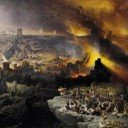This very brief post is needed to discuss the concept of apocalyptic language. before entering the passage itself we need to understand the type of language being used and how it is different from other forms. And most importantly note the dangers of misrepresenting a particular literary style. Below is a passage to use as an example of the dangers of misrepresenting the intent of the passage because of the language and literary style. I have bolded out some very “apocalyptic” language for out purposes.
Psalm 18:7-15 Then the earth reeled and rocked; the foundations also of the mountains trembled and quaked, because he was angry.
[8] Smoke went up from his nostrils, and devouring fire from his mouth; glowing coals flamed forth from him.
[9] He bowed the heavens and came down; thick darkness was under his feet.
[10] He rode on a cherub and flew; he came swiftly on the wings of the wind.
[11] He made darkness his covering, his canopy around him, thick clouds dark with water.
[12] Out of the brightness before him hailstones and coals of fire broke through his clouds.
[13] The Lord also thundered in the heavens, and the Most High uttered his voice, hailstones and coals of fire.
[14] And he sent out his arrows and scattered them; he flashed forth lightnings and routed them.
[15] Then the channels of the sea were seen, and the foundations of the world were laid bare at your rebuke, O Lord, at the blast of the breath of your nostrils.
This apparently very apocalyptic psalm sounds like a passage from Revelation or Daniel. One we would expect to find describing the Dispensational view of the soon coming great tribulation. The sea was lifter up and the foundations of the earth were laid bare. There is lightning, thunder, hailstones, fire and the Lord descending in the clouds! This must be a prophetic pronouncement about the end of the world!
But alas, the first verse reveals the true nature of the passage.
Psalm 18:1 To the choirmaster. A Psalm of David, the servant of the Lord, who addressed the words of this song to the Lord on the day when the Lord rescued him from the hand of all his enemies, and from the hand of Saul…
This beautiful psalm has nothing to do with an apocalyptic event of our near future, but rather a picture of the rescue of David from the hands of his enemies. Davis uses this literary style to express the power and awesomeness of the act of God in rescuing him.
The Bible is replete with this kind of language and to discover it’s use and how and why the author employs this technique is the job the student of Scripture. Do not rush to exclaim this literary style as some literal description of events, but rather search the Scriptures to discover it’s previous usage and how it relates to the passage at hand.
This will be out job as we discuss the Olivet Discourse. We will consider the passages (moon, stars, sun, darkness, clouds, etc) and see how Scripture employs them previously and how we should interpret them within the framework of the passage and the totality of Scripture. Be warned, though, the result may not be as exciting as a meteor shower of apocalyptic proportions, but the results will be much more rewarding.





No comments:
Post a Comment